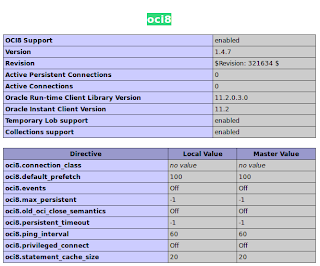<?php
//Connect String
$db="(DESCRIPTION=
(ADDRESS_LIST=
(ADDRESS=(PROTOCOL=TCP)
(HOST=REMOTE_DB_IP)(PORT=XXXX)
)
)
(CONNECT_DATA=(SID=ORACLE_SID))
)";
//Connect to DB
$conn = oci_connect('USERNAME','PASSWORD',$db);
//Run a sample query
$s = oci_parse($conn, 'select * from DB_TABLE');
oci_execute($s);
oci_fetch_all($s, $res);
echo "<pre>\n";
var_dump($res);
echo "</pre>\n";
//Close DB Connection
oci_close($conn);
?>
Wednesday, August 22, 2012
Using PHP/oci8 to Connect to Oracle Remote DB
With this short PHP script, you can see how I connect to a remote Oracle DB:
Installing OCI8 On Debian
OCI8 is an extension for providing APIs to Oracle database management system. You need Apache, PHP and Oracle Instant Client.
Register and Download Oracle Instant Client. Choose your platform compatibility (in my case x64), if the package not compatible with your platform then installation process will failed. At least, we just need Basic and SDK. Then put on /opt/oracle or whatever directory did you liked:
unzip instantclient-basic-linux.x64-11.2.0.3.0.zip
Create symbolic links for dinamic library and Add instant client to system ld:
Compiling OCI8 and enter instantclient,/oracle_client when you are prompted:
Enable oci8 extension on php.ini or add it to php Conf:
and add this line to file:
extension=oci8.so
then restart apache2 web server.
/etc/init.d/apache2 restart
Then check phpinfo() and the successfull installation should be :
When you get this error:
you should install libaio:
apt-get install libaio1
Register and Download Oracle Instant Client. Choose your platform compatibility (in my case x64), if the package not compatible with your platform then installation process will failed. At least, we just need Basic and SDK. Then put on /opt/oracle or whatever directory did you liked:
mkdir /oracle_client
mkdir /opt/oracle
cd /opt/oracle
unzip instantclient-basic-linux.x64-11.2.0.3.0.zip
unzip instantclient-sdk-linux.x64-11.2.0.3.0.zip
mv /opt/instantclient_11_2/* /oracle_client/
Create symbolic links for dinamic library and Add instant client to system ld:
cd /oracle_client
ln -s libclntsh.so.11.1 libclntsh.so
ln -s libocci.so.11.1 libocci.so
Compiling OCI8 and enter instantclient,/oracle_client when you are prompted:
pecl install oci8
Enable oci8 extension on php.ini or add it to php Conf:
vim /etc/php5/conf.d/oci8.ini
and add this line to file:
extension=oci8.so
then restart apache2 web server.
/etc/init.d/apache2 restart
Then check phpinfo() and the successfull installation should be :
When you get this error:
PHP Warning: PHP Startup: Unable to load dynamic library '/usr/lib/php5/20090626/oci8.so' - libaio.so.1: cannot open shared object file: No such file or directory in Unknown on line 0
you should install libaio:
apt-get install libaio1
Tuesday, August 21, 2012
Get an IP address out of fail2ban jail
Removes an iptables rule created by fail2ban. This example shows how to
remove a rule for an IP from the fail2ban-apache chain. Can be used for
any service monitored by fail2ban:
or remove from fail2ban-SSH jail:
iptables -D fail2ban-SSH -s IP_ADDRESS_TO_SET_BE_FREE
iptables -D fail2ban-apache -s IP_ADDRESS_TO_SET_BE_FREE
or remove from fail2ban-SSH jail:
iptables -D fail2ban-SSH -s IP_ADDRESS_TO_SET_BE_FREE
Monday, August 20, 2012
Resize a VirtualBox hard disk (.VDI) in Linux
I would recommend backing up your current vdi file before doing this!
Run this command in terminal:
It resizes your hard disk to 20GB.
Run this command in terminal:
VBoxManage modifyhd YOUR_HARD_DISK.vdi --resize SIZE_IN_MB Example:VBoxManage modifyhd MyWindows7.vdi --resize 20000It resizes your hard disk to 20GB.
Start your guest machine and resize the partition with your suitable tool. (for example: Gparted for Linux or Windows Partition Manager for windows)
Wednesday, August 8, 2012
Block a message by a specific email SUBJECT - PLESK
Custom filter rules can be defined in /etc/mail/spamassassin/local.cf, for example:
The first string defines the match rule. A regular expression is used in 'header' to check the message's subject.
The second string describes the filter.
And the third string defines how much scores should spamassassin set to the matching message.
You can find more info on writing custom rules for spamassassin in Mail::SpamAssassin::Conf manual page:
Source: http://kb.parallels.com/en/1038
header CUSTOM_SUPERSPAM Subject =~ /.*spam subject.*/i
describe CUSTOM_SUPERSPAM Superspam messages
score CUSTOM_SUPERSPAM 100.0
The first string defines the match rule. A regular expression is used in 'header' to check the message's subject.
The second string describes the filter.
And the third string defines how much scores should spamassassin set to the matching message.
You can find more info on writing custom rules for spamassassin in Mail::SpamAssassin::Conf manual page:
# man Mail::SpamAssassin::Conf
Subscribe to:
Posts (Atom)
